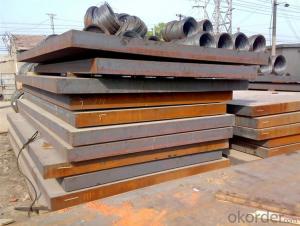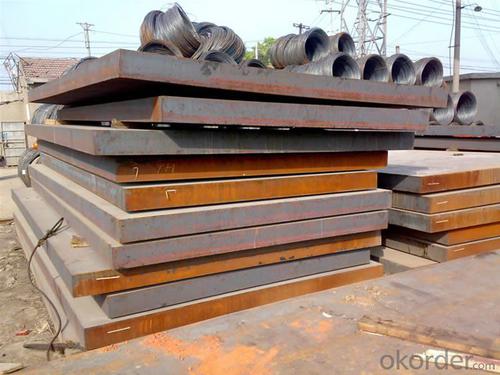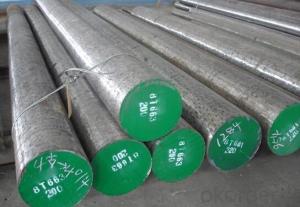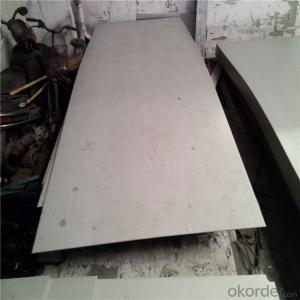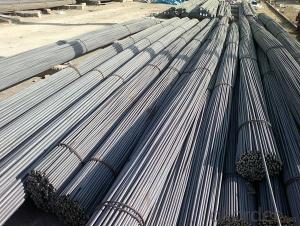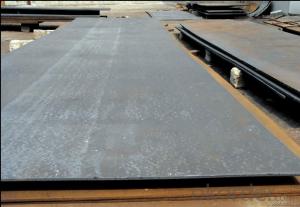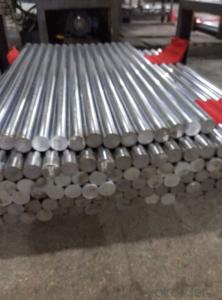Hot Rolled 5140 Steel, 5140 Steel Structure, 5140 Steel Plate
- Loading Port:
- China main port
- Payment Terms:
- TT OR LC
- Min Order Qty:
- 25 m.t.
- Supply Capability:
- 10000 m.t./month
OKorder Service Pledge
OKorder Financial Service
You Might Also Like
Specification
Hot Rolled 5140 Steel, 5140 Steel Structure, 5140 Steel Plate
Equivalent grades
| GB | DIN | AISI | JIS |
| 42CrMo | 1.7225 | 4140 | SCM440 |
Chemical Composition
| C | Si | Mn | Cr | Mo | P | S |
| 0.38-0.43 | 0.40max | 0.60-0.90 | 0.90-1.20 | 0.15-0.30 | ≤0.035 | ≤0.035 |
Available size
| Round steel bar 60-800mm | |||||||||
| Flat steel bar 25-400mm*200-800mm |
Surface condition
| Black surface/ Grinded/ Machined |
Hardness
| Annealed HBS 217 max |
Characteristics
| 4140 Alloy Steel/SAE 4140 Steel Price is engineering steel supplied in quenched and tempered conditions. Very good machinability. High toughness. High creep strength. Repeated impact resistant capability. |
Applications
| 4140 Alloy Steel/SAE 4140 Steel Price is use to producecomponents with high requirements on toughness, e.g. gear wheels, pinions, connecting rods, parts for mechanical engineering . |
Heat treatment
| Forging | Heat to 1150°C. Hold until uniform. Minimum forging temperature 850°C.Cool slowly in ashes or sand etc. | ||||||||
| Annealing | Heat to 830°C-850°C.Cool in furnace. | ||||||||
| Normalising | Heat to 870°C-900°C.Cool in still air. | ||||||||
| Stress Relieving | Annealed: Heat to 600°C-650°C.Hardened: Heat to 500°C-550°C.Cool in still air. | ||||||||
| Hardening | Heat to 830°C-880°C. Quench in oil or polymer. | ||||||||
| Tempering | Heat to 450°C-700°C cool in still air. NB. Tempering within the range 200°C-420°C will result in temper brittleness and should be avoided. | ||||||||
Product Show:


1, Your advantages?
professional products inquiry, products knowledge train (for agents), smooth goods delivery, excellent customer solution proposale
2, Test & Certificate?
SGS test is available, customer inspection before shipping is welcome, third party inspection is no problem
3, Payment Terms?
30% TT as deposit and 70% before delivery.
Irrevocable L/C at sight.
4, Trading Terms?
EXW, FOB, CIF, FFR, CNF
6, After-sale Service?
WE provides the services and support you need for every step of our cooperation. We're the business partner you can trust.
For any problem, please kindly contact us at any your convenient time.
We'll reply you in our first priority within 24 hours.
- Q: How does special steel contribute to sustainable construction?
- Special steel contributes to sustainable construction in several ways. Firstly, special steel is highly durable and has a longer lifespan compared to traditional building materials. This means that structures built with special steel require less maintenance and repairs over time, reducing the overall environmental impact. Secondly, special steel is often made from recycled materials, such as scrap metal, which helps to conserve natural resources and reduce waste. The recycling process also requires less energy compared to producing new steel, further reducing the carbon footprint. Additionally, special steel offers high strength-to-weight ratio, allowing for lighter and more efficient construction designs. This leads to reduced material consumption and transportation costs, as well as minimizing the load on the foundation and infrastructure. Lastly, special steel is highly resistant to corrosion and can withstand extreme weather conditions. This resilience ensures the longevity of the structures, reducing the need for replacements and minimizing construction waste. Overall, special steel's durability, recyclability, lightweight nature, and resistance to corrosion contribute significantly to sustainable construction practices by minimizing environmental impact, conserving resources, and promoting long-lasting structures.
- Q: How is boron steel used in automotive safety applications?
- Boron steel is used in automotive safety applications due to its exceptional strength and ability to absorb impact energy. It is commonly utilized in the construction of car bodies and safety components such as side impact beams, roll cage reinforcements, and door intrusion beams. By incorporating boron steel, vehicles can better withstand and distribute crash forces, providing enhanced protection to occupants during collisions.
- Q: What are the different methods of surface protection for special steel?
- There are several different methods of surface protection for special steel, each offering unique benefits and suitable for specific applications. Some of the most common methods include: 1. Galvanization: This process involves coating the steel with a layer of zinc, which provides excellent corrosion resistance. Galvanization can be done through hot-dip galvanizing or electroplating, depending on the specific requirements. 2. Paint coating: Applying a paint coating to the surface of special steel helps to protect it from corrosion and environmental elements. The paint acts as a barrier between the steel and external factors, preventing rust and damage. 3. Powder coating: Powder coating involves applying a dry powder to the steel surface and then heating it to form a protective layer. This method provides excellent resistance to corrosion, chemicals, and abrasion, making it ideal for applications where the steel is exposed to harsh conditions. 4. Electroplating: Electroplating involves depositing a layer of metal onto the steel surface through an electrochemical process. This method enhances the steel's corrosion resistance and can provide additional benefits such as increased hardness or improved aesthetics. 5. Thermal spraying: This method involves melting or heating a material, such as zinc or aluminum, and spraying it onto the steel surface to form a protective coating. Thermal spraying provides excellent corrosion protection and can be used to repair damaged surfaces. 6. Ceramic coating: Ceramic coatings are highly resistant to corrosion, abrasion, and high temperatures. They are often used in applications where the steel is exposed to extreme conditions, such as in the aerospace or automotive industries. 7. Passivation: Passivation is a chemical process that removes free iron and other contaminants from the surface of stainless steel. This helps to improve the steel's corrosion resistance by forming a passive oxide layer. It is important to select the appropriate surface protection method based on the specific requirements of the steel and the application it will be used in. Factors such as the level of corrosion resistance needed, the environmental conditions, and the desired lifespan of the steel should all be considered when choosing a surface protection method.
- Q: What are the requirements for special steel used in ballistic protection?
- The requirements for special steel used in ballistic protection are quite stringent and specific. Firstly, the steel should possess a high level of hardness and strength to effectively withstand the impact of ballistic threats. This is typically achieved through the addition of alloying elements such as chromium, nickel, and molybdenum, which enhance the steel's strength and hardness. Additionally, the steel should exhibit excellent toughness and ductility to prevent brittle fracture upon impact. This is crucial as it ensures that the steel can absorb and dissipate the energy from the ballistic threat, reducing penetration and minimizing the risk of injury. Furthermore, the special steel used in ballistic protection should have exceptional resistance to deformation and penetration. It should be able to resist deformation even under high-velocity impact, maintaining its structural integrity and preventing the penetration of the ballistic threat. Another important requirement is good weldability, as many ballistic protection components are typically assembled through welding. The steel should have low susceptibility to cracking during the welding process, allowing for the fabrication of strong and reliable ballistic protection systems. Lastly, the special steel used in ballistic protection should possess excellent corrosion resistance. This is necessary to ensure the durability and longevity of the protective equipment, especially in environments where exposure to moisture, chemicals, or harsh weather conditions is likely. To meet these requirements, various types of special steel have been developed, such as high-hardness armor steel, ballistic steel, and armor-piercing steel. These steels are often subject to rigorous testing and certification processes to ensure they meet the necessary ballistic protection standards.
- Q: Can special steel be used in the beverage manufacturing industry?
- Yes, special steel can be used in the beverage manufacturing industry. Special steel, such as stainless steel, is commonly used in beverage processing equipment due to its corrosion resistance, hygienic properties, and durability. It is particularly suitable for manufacturing tanks, pipes, valves, and other components that come into contact with beverages, ensuring a high level of safety and maintaining the quality of the products.
- Q: What are the requirements for special steel used in mining equipment?
- The requirements for special steel used in mining equipment are quite stringent due to the demanding nature of the mining industry. Here are some of the key requirements: 1. High strength and toughness: Mining equipment operates in extremely harsh conditions, where it is subjected to heavy loads, impacts, and abrasion. Special steel used in mining equipment must have high strength to withstand these forces and maintain its structural integrity. Additionally, it should possess excellent toughness to prevent fractures and withstand sudden shocks. 2. Corrosion resistance: Mining operations often take place in corrosive environments, such as underground mines or near bodies of water. Special steel used in mining equipment should exhibit high resistance to corrosion and oxidation to ensure its longevity and prevent premature failure. 3. Wear resistance: Mining equipment is exposed to abrasive materials, like rocks and minerals, which can cause significant wear. The special steel used in mining equipment should have excellent wear resistance properties to withstand continuous abrasion and prevent premature wear and tear. 4. Heat resistance: Mining equipment is frequently exposed to high temperatures due to the friction generated during operation or proximity to heat sources. Special steel used in mining equipment should have good heat resistance to maintain its mechanical properties and prevent deformation or structural failure. 5. Fatigue resistance: Mining equipment undergoes repetitive and cyclic loading, which can lead to fatigue failure over time. Special steel used in mining equipment should possess high fatigue resistance to avoid cracking or failure under these cyclic loading conditions. 6. Weldability and machinability: Special steel used in mining equipment should have good weldability and machinability to facilitate the fabrication and assembly processes. This ensures that the equipment can be easily manufactured, repaired, or modified as required. 7. Regulatory compliance: Mining equipment often needs to meet specific regulatory standards and certifications to ensure safety and environmental compliance. Special steel used in mining equipment should adhere to these regulations, ensuring that the equipment is safe to operate and does not pose any environmental hazards. In summary, the requirements for special steel used in mining equipment include high strength and toughness, corrosion resistance, wear resistance, heat resistance, fatigue resistance, weldability and machinability, and compliance with regulatory standards. These requirements ensure that the steel can withstand the harsh conditions and demanding operations encountered in the mining industry.
- Q: Can special steel be used in the wind turbine manufacturing industry?
- Yes, special steel can be used in the wind turbine manufacturing industry. Special steel, such as high-strength or corrosion-resistant alloys, is often used in the construction of wind turbine components due to its durability, strength, and resistance to harsh environmental conditions. These specialized steel alloys help ensure the longevity and performance of wind turbines in the renewable energy industry.
- Q: What are the properties of electrical steel?
- Electrical steel, also known as silicon steel, possesses several important properties that make it suitable for various electrical applications. It has a high magnetic permeability, which means it can efficiently conduct magnetic flux, making it ideal for use in transformers, motors, and generators. Additionally, electrical steel exhibits low core losses, reducing energy dissipation during operation. Its high electrical resistivity minimizes eddy currents, further improving efficiency. Furthermore, electrical steel has a laminated structure, reducing hysteresis losses and preventing magnetic domains from aligning, which helps in maintaining a stable magnetic field. Overall, electrical steel's properties make it a crucial material for efficient and reliable electrical devices.
- Q: What are the characteristics of special stainless steel?
- Special stainless steel, also known as superalloys, possess several unique characteristics. Firstly, they exhibit exceptional resistance to corrosion, making them highly durable and long-lasting in harsh environments. Additionally, they have high strength and toughness, allowing them to withstand extreme temperatures and pressures. Special stainless steel also demonstrates excellent heat resistance, making it suitable for applications in high-temperature environments. Furthermore, these alloys often exhibit superior chemical stability, resistance to wear and tear, and excellent mechanical properties, making them highly versatile for various industrial applications.
- Q: What properties make special steel unique?
- Special steel, also known as alloy steel, possesses unique properties that set it apart from other types of steel. Firstly, special steel is distinguished by its exceptional strength and hardness. It is engineered to have a high resistance to deformation, making it suitable for applications that require robust materials. Whether in construction, automotive, or aerospace industries, special steel provides the necessary durability and reliability. Another remarkable property of special steel is its superior corrosion resistance. By incorporating certain alloying elements such as chromium, nickel, or molybdenum, this type of steel becomes highly resistant to rust and other forms of corrosion. As a result, special steel is often used in marine environments, chemical plants, and oil and gas industries where exposure to harsh conditions is prevalent. Furthermore, special steel demonstrates excellent heat resistance. It can withstand high temperatures without losing its strength or structure, making it suitable for applications in extreme heat environments, such as power generation or furnace components. This property allows special steel to be utilized in critical situations where other materials may fail or degrade. Special steel is also known for its versatility and adaptability. With various alloying elements and heat treatment processes, it can be tailored to meet specific requirements of different industries. This flexibility makes it possible to create specialized alloys with unique properties, such as improved machinability, wear resistance, or enhanced magnetic properties, catering to a wide range of applications. In conclusion, the properties that make special steel unique are its exceptional strength and hardness, superior corrosion resistance, excellent heat resistance, and its versatility in being tailored to specific requirements. These properties make special steel an invaluable material in numerous industries, enabling the development of innovative and reliable products.
Send your message to us
Hot Rolled 5140 Steel, 5140 Steel Structure, 5140 Steel Plate
- Loading Port:
- China main port
- Payment Terms:
- TT OR LC
- Min Order Qty:
- 25 m.t.
- Supply Capability:
- 10000 m.t./month
OKorder Service Pledge
OKorder Financial Service
Similar products
Hot products
Hot Searches
Related keywords
